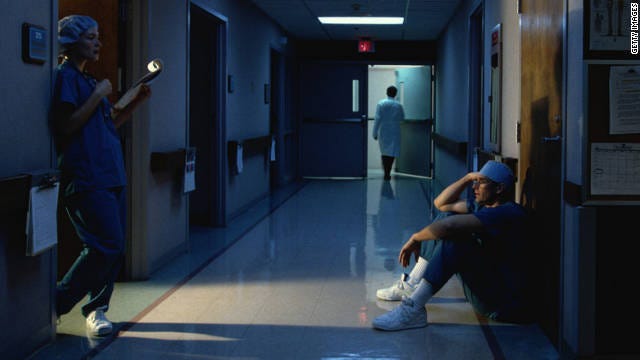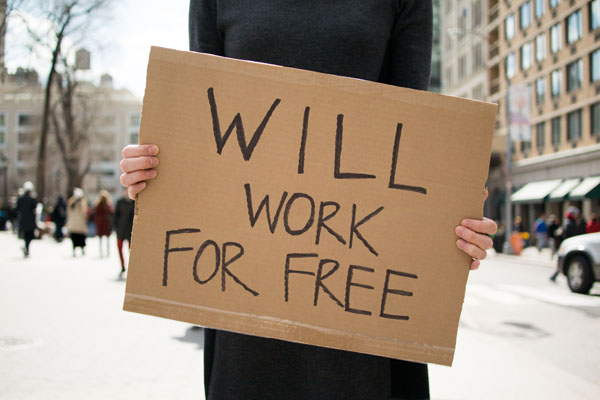i.
First off, with very few exceptions, unpaid internships are immoral and disgusting. Any business, especially a multi-million-dollar tech behemoth, that justifies not paying interns is evil. But because the “good guys” lost the plot decades ago (by shying away from unions, by courting corporate donations, by being privileged and unaffected, by not understanding how narrative works), this is not only accepted as legit, it’s seen as good business.
And it mirrors what’s been happening not only in media and the broader corporate world, but even within the ostensible “good guy” culture of our literary industry, where gatekeepers (all well-remunerated, all in relatively stable perches of stability) make few sacrifices even as they do less for authors and the communities that support them. For these folks to tolerate free labor is an affront, and they need to be called out, and those of us with some creative skin in the game need to connect the dots (or at least attempt to do so in ways that don’t stop at useless slogans and feel-good solidarity with words not actions), helping change things from the inside.
Speaking of Narrative with a capital-N, the bad guys have kept it simple, effectively convincing many Americans to believe any taxation is bad (and that obscenely wealthy shouldn’t have to pay any taxes at all), the free market is objective and fair in both theory and practice, regulation is onerous, and if you hustle you’ll succeed (see George Carlin on the American Dream Myth). Oh, and government is bad (unless a natural disaster hits your town, but don’t talk about climate change even as the government-employed, tax-funded workers are pulling you into the boat). An unfettered and unregulated Free Market Machine allows scumbag CEOs to endorse free internships, the adjunct model at universities to proliferate (funny, tuition has skyrocketed in recent decades and there are less professors getting hired with benefits, where in the world is all that money going?), grade school teachers buying their own classroom supplies, and exploited blue collar workers voting against the same universal health care that’s standard in every other thriving country (while protesting that vaccines are proof that Big Pharma is evil).
I recommend this brilliant and timely piece (ha! and it was written a quarter-century ago!!) and also encourage anyone who reads it to share and consider subscribing to The Baffler, a true independent outlet and a model for how journalism can (and should) work in our brave new world. Also: help support non-profits and get in the game; there are very wealthy interests working around the clock while we sleep: they’ve already amassed uncountable profits—their ultimate goal is apathy. Without resistance, the pillaging will continue.
Money quote (the entire piece is essential):
“The glamour industries enjoy a tremendous surplus of labor. There are more people who want media jobs than can be employed. Therefore labor is cheap, as demonstrated by the industry’s already low salaries ($18,000 a year for an editorial assistant is not uncommon, which is about $9 dollars an hour, assuming the most optimistic work schedule possible). Left to its own devices, a rational market with surplus labor will bid wages down almost to the point where no one will accept a job. If it can, a market will bid the wages all the way down to zero, as long as someone, anyone, will do the work, for whatever real or imagined benefit……Businesses, obviously, have a real, bottom-line incentive to encourage the trend toward labor that is not only free, but without any type of obligation whatsoever. In other words, interns are restructuring the labor market.”

ii.
Sending this one out to anyone who has spent more time than is healthy in hospitals, as well as everyone who teaches (or recognizes that teachers and nurses are the MVPs of society, the ones who help those with the least –money, resources, hope– stay afloat; the ones who, by doing their often thankless jobs, allow the rest of us to do our jobs. And thanks again to Dumbo Press for showing my poetry some love, Brooklyn style.
Economies of Scale
I’m a survivor, which means I’ve spent time in hospitals, and it also means I’ve left them when certain loved ones haven’t, which means I know hospitals and have learned to hate and appreciate them in ways those who only fear them can’t fathom. I’ve studied hospitals the way inmates count the spots on their jail cell ceilings, crammed as they are into tiny spaces and forced to contemplate all the things they could or should have done differently. Like veterans of other conflicts involving life and death, it’s clear someone has seen certain things the less they wish to discuss them. Having spent time in hospitals helps you know what to look for (nurses) and what to never expect (doctors). And then there are the things you can’t avoid, like the impossible smell of sterilizing agents and bodily fluids battling to eternal stalemate, or the sudden solidarity that accompanies the sight of anyone at any age in slippers, doing laps in silent hallways. Or watching steel trash bins wheeled from room to room, idly calculating the various types of waste being transported. And it seems only poets or economists may invariably find themselves calculating the ratios, wondering how so much can accumulate in one hour, all this pain purposefully packed into tightly sealed bags. How it’s just one floor of one hospital on one city block in a town full of houses and offices and gas stations and restaurants. Then multiplying that mass per zip code and therefore entire states, and therefore countries, and therefore continents, and then wondering where all these things go (Into space? Under the ocean? Increasingly, inside our bodies, plastics and poison recycled like our sins). And then one might get truly carried away pondering the implications of our tiny planet, a pinprick within an ever-expanding cosmos, itself part of some eternal Everything, and that’s not even bringing angels and gods and celestial real estate into the equation. These economies of scale beg many unanswerable questions but, for survivors (particularly during repeat performances), certain conclusions. First: only those fortunate enough to have loved ones suffer this way, and it’s the curious reward of lives spent as well as we’re able: bearing witness as we work with the raw materials we’ve been provided. Second: the only thing, aside from teachers, saving us from utter attenuation is our nurses, who provide a modicum of dignity, helping us avoid messes we’d otherwise make; who remind us that even the dirtiest work we’re obliged to do is always mitigated by someone doing worse, how for every good death there are adult diapers changed and dispensed with, indignities dealt with behind closed doors, and when visiting hours end there are gentle armies patrolling the dark and mostly dormant wards, doling out gifts most of us can afford to ignore.

